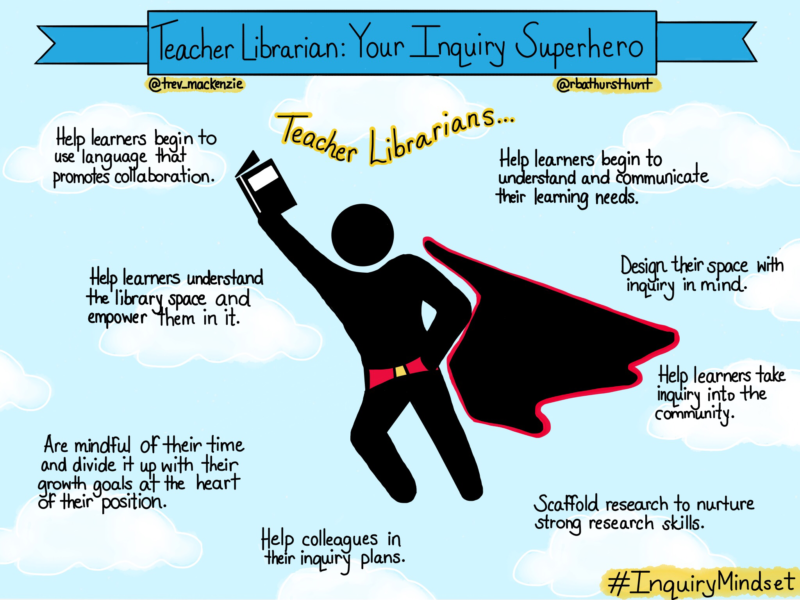Teacher-Librarians Have More Flexible Schedules
The librarian’s schedule and workday provide more flexibility so they can be available to help teachers. The door is open, why not come in? Also, it is my experience that teacher-librarians love having discussions with teaching colleagues–they get to play an active role in student progress and success. I have often stopped by the library unannounced, with the intention of just asking a quick question. What starts out as a two minute query ends up in a rich, inspiring discourse that goes well beyond "a quick question."
Sometimes I have an underdeveloped idea for an inquiry project and I need a sounding board. How do I figure out a starting point? What will be our goal? What steps should we take to get there? How do I keep things student-centered? During our conversation, the teacher-librarian is willing to listen to me, assess my students’ needs, reflect on an array of resources and learning materials to support us, and then supply them in a timely and easy manner. They ask questions I hadn’t yet thought of, and they direct me toward objectives I had not previously considered. They want to make realizing my lesson goals as easy and seamless as possible.
This type of personalized help makes me feel supported when I sometimes feel like I’m teaching "on an island." The Teacher-librarians' unique training gives them a way to assist me in my teaching goals and help me in ways I had not previously envisioned. The flexibility continues. As our inquiry work progresses, the teacher-librarian follows up with us, visiting our classroom to see how the work is coming along, asking questions, making observations, and offering up next steps of support. Students begin to see the teacher-librarian as a “learning partner” — a more authentic support of what’s happening in the classroom.
Teacher-Librarians Strengthen Support
As committed as I am to the inquiry method of learning, and though I have published work to help teachers in the practice, I still have areas of weakness. Mine in particular is the research component. This is where the teacher-librarian is a great partner. They develop a collaborative alliance with me and discover my teaching strengths and weaknesses objectively, without judgement. Because of their training, they have a knack of offering up just the right support in ways that lift up or elevate my teaching practice. They complement my instruction with their own when working with students to assist in the research phase of inquiry.
Teacher-librarians employ their unique expertise as they walk students through the learning library and demonstrate how to navigate databases and locate resources. They also sharpen research skills by helping students understand the validity of information and evaluate it by recognizing bias and persuasion in various sources. This is difficult for both teachers and students to master. I have been so thankful to have teacher-librarians who offer help in this area that I find extremely challenging. It balances out the inquiry experience for my students and provides them (and me) with the support necessary to follow through with our big ideas and meet our learning goals.
A True Teaching Partner
The teacher-librarian is truly a second teacher in inquiry, an additional support for all of my students as we embark on more personalized learning structures and objectives. The more I include my teacher-librarian, the more I find that they are able to help students with inquiry: the collaboration becomes a powerful cycle of support that gains momentum and benefits the students, the teacher, and the culture of learning in the school.
Students can also visit the library to seek out support from the teacher-librarian on their own time outside of class, because they now see that person as "in on the learning" and someone who understands the inquiry and can provide support and help. The teacher-librarian knows the resources in the library, how to locate them, and how to empower students in this process. Students then become more competent independent researchers and learners themselves.
Just as I intentionally nurture a culture of inquiry that gradually releases control over learning to the student, so too does the teacher-librarian partner with the teacher in their support of the student. Now there is a collaborative team dedicated to meeting the needs of the students. Each learner has access to learning and materials based on their learning strengths challenges. The teacher-librarian also gets to know each learner’s topic and can help personalize inquiry much better than I could if I worked alone. The end result is a collaborative team that reinforces independent learning.
Teachers everywhere struggle with meeting student needs even though we have few resources. We also struggle with the breadth of our own learning and practice. We have to get creative. But what if a truly great resource is at our own school, right under our noses? A teacher-librarian is the ideal partner for inquiry – they are flexible and can make time for us and our students. They are a great sounding board to help inquiry projects take shape, make authentic progress and meet meaningful objectives. They build meaningful relationships with students and help them hone their inquiry skills while taking responsibility for their own learning.
Teachers do not need to teach "on an island" with little support when there is such a rich resource in the library–not just for us, but for our students as well. Teachers also don’t have to know everything about a practice from the start: they can learn with their students along the way. It will make them better teachers. Students do better in general when they have more adults on campus they know have concern for them. The teacher-librarian can become a valuable support for teacher practice and student academic growth, as well as their emotional health. Why not make use of this amazing school asset?



